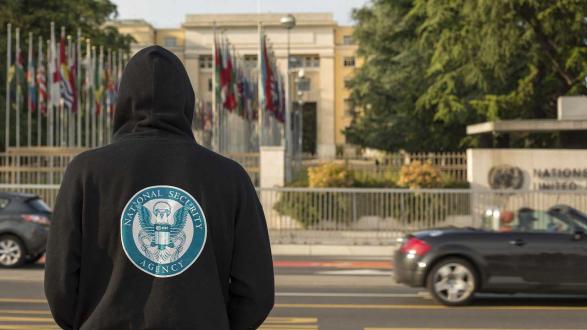At the beginning of a Members Weekend working group discussion on mass surveillance in the United States, Jessica Yellin asked participants: “By a show of hands, who here is troubled by the state of government surveillance in America?”
Less than half of the individuals in the room raised their hands.
“Who here is not troubled by the state of government surveillance, and thinks it is necessary?”
This time, more than half of the participants raised their hands.
The balance between security and privacy has become a fundamental question of U.S. national identity. How should we conceive of privacy in the 21st century? Would we be talking about this if not for Edward Snowden? What does the surveillance future look like?
Privacy is history
Yellin’s first discussion question was directed to Jonathan Kotler, an associate professor of journalism at USC: “Are we headed toward a surveillance state?”
Kotler was unambiguous: “We’re there. We’ve been there.”
There were plenty of points of contention between participants during the discussion, but all agreed that Americans have indeed sacrificed some level of privacy. As Kotler put it: “Privacy is a subject matter that will be discussed in history class.” You cannot reverse the current state of surveillance in the world, he argued: it’s a moot point.
Surveillance is a form of political power and social control. It implies being constantly monitored, without a system of checks and balances for protection.
The terminology we use for surveillance, however, might require a refresh. Dr. Anthony Field, another visiting expert, sought to clarify the differences between a “surveillance state” and a "state with surveillance architecture.” A Western liberal democracy like the United States, according to Field, resembles the latter.
His point: surveillance is a form of political power and social control. It implies being constantly monitored, without a system of checks and balances for protection. It is an important tool for totalitarian regimes, whose societies always run the risk of revolution and upheaval. There is a difference between that kind of surveillance state and the form of surveillance architecture in much of the Western world today.
The United States still has a system of checks and balances. Americans are not dealing with unaccountable secretive agencies beyond the rule of law and oversight. Our system of surveillance in the United States, however problematic, is still under the democratic control of the people. Field highlighted the USA Freedom Act, passed in 2015, which imposes new restraints on surveillance in the United States.
Edward Snowden
Two years ago, Edward Snowden revealed the extensive surveillance infrastructure of the NSA to the world. Journalists Glenn Greenwald, Laura Poitras, Barton Gellman, and others reported on the enormous cache of documents Snowden provided, and the debate around government surveillance has raged on ever since. Most Americans now believe Snowden was justified in his actions, but many still remain convinced he committed treason.
Participants agreed that the debate around government surveillance is good for American democracy.
There has been a massive shift in public perception following Snowden’s revelations. In January 2010, the American public said by a 63 to 25 margin that the government didn't go far enough in surveillance. According to a Pew Research poll in March 2015, a majority of Americans (54 percent) now disapprove of the U.S. government’s collection of telephone and internet data as part of anti-terrorism efforts, while 42 percent approve of the program.
“The issue with Snowden is that he downloaded a treasure-trove of secret and classified information and then went off to Russia.” - Anthony Field
“Would we even be having this conversation were it not for Snowden?” asked Jessica Yellin. Anthony Field said yes: “It would have come out at some point. Everybody knew what the NSA was doing. It was reported as kind of a ‘gotcha’ moment, when really it wasn’t.”
Yellin pointed out: “The same people who say ‘everybody knew this’ will then in the next sentence say ‘and Edward Snowden is a traitor to his nation.’” “The issue with Snowden is that he downloaded a treasure-trove of secret and classified information and then went off to Russia,” Field countered. Several other participants agreed: “He gave our technology playbook to everyone.”
What lies ahead?
Discussants agreed that policy has not caught up to advances in technology. As one participant put it, “Policy or law cannot keep pace with information and the technology revolution.” That means that our reaction to perceived surveillance overreach will always be just that: a reaction.
But many participants were less concerned with government overreach than with the burgeoning influence of criminal elements, often targeting corporations and individuals. If policy will always lag behind the capabilities in this arena, who should Americans trust to protect their information – medical records, emails, phone records, passwords? In a world where individual hackers can break into the personal emails of high-ranking U.S. intelligence officials, a majority of participants were more worried about security than the loss of personal privacy. As one member explained, “For several years I have had zero expectation of personal privacy.”
The biggest concern for the majority of participants was not the overreach of government, but rather the burgeoning influence of criminal elements, often targeting corporations and individuals.
In an ideal world, society could fashion laws that provide more security and privacy at the same time. “It’s not a zero-sum game,” said one participant. Legal protections would have to involve checks and balances on private sector collection of individuals' data.
But we are a long way off from a comprehensive solution.
____________________
This article is based on comments made during a working group discussion at the Pacific Council's annual Members Weekend conference on October 10.
Photo credit: Flickr user Frederic.Jacobs




